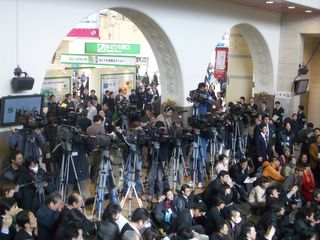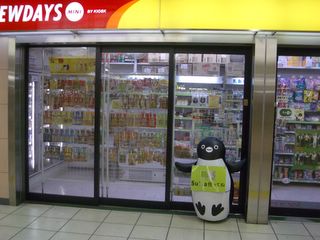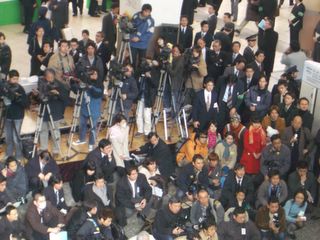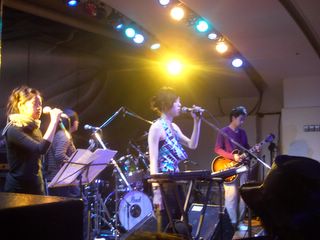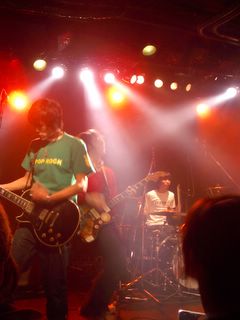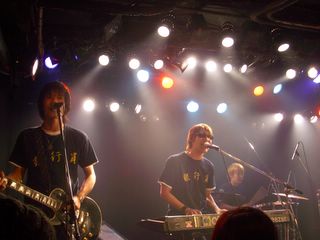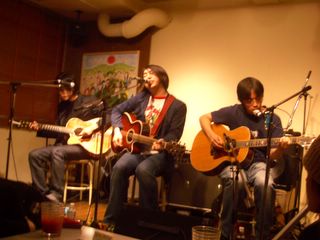
Plectrum live at Mona Records.

One of the treasures in my music collection is a mini-disc that contains a recording I made of Japanese rock band Plectrum’s two shows in Seoul in March last year, during their first visit to Korea with three other Japanese bands. What a glorious time that was! I witnessed the creation of friendship between the musicians of Korea and Japan, two countries that are across the sea from each other but often seem much further apart.
Plectrum helped bring the Japanese and Koreans together by playing two of the best shows I’ve ever seen. I’ve written before that a small Plectrum fan club sprang up in Seoul right after those performances. In this MD of mine is a record of those shows.
In one part of the recording, during a ballad called "Book End", Plectrum singer Taisuke Takata calls out in Korean to the Korean audience: "Yorobun!", meaning ‘everyone’. "OOH!", the crowd responds, a happy gasp. Takata then yells, "Saranghaeyo!"– I love you!– and in my MD you can hear women’s screams and laughter, like the final scene of Full Monty. It still makes me a bit emotional when I hear that part of the recording.
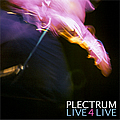
Plectrum's new album, Live 4 Live.

Now everyone can get a feel for what Plectrum, one of Tokyo’s best live bands, is like on stage, because they have just released a live album called Live 4 Live. It includes performances in Tokyo and Osaka and their second Seoul tour in September. A recording could never substitute for actually seeing Plectrum live, but this CD is nevertheless a satisfying one, one that shows how the band plays with both the precision of experienced musical artisans but also an almost out-of-control passion. At the end of the album is a song whose significance you’d miss if you didn’t know what was happening at the show. It was the second show of the September Seoul tour, and in the middle of one of the songs the sound system went down. The band was about to stop, but the crowd began to sing as one big chorus Plectrum’s song, in Japanese, until the sound came back up. I wrote about this experience before here and here. It feels like a miracle that I can hear it again on a CD.

Plectrum live in Seoul, September 2004.

Plectrum held a concert this week at the Mona Records in Shimokitazawa to celebrate the launch of their new album. A café that also sells CDs and hosts nightly shows, Mona is a comfy venue, like listening to live music in the livingroom of a friend’s home. I took off my shoes to sit on the floor in the elevated area near the stage. It’s like a Japanese home – even the band members play shoeless, wearing socks!
The show was supposed to be "acoustic", but when Japanese bands say that it usually means they will still use amps, but maybe at a slightly lower volume. In fact, despite its being an "acoustic" show, Plectrum were pretty loud. Singer Takata said that the go (Chinese board-game) club upstair from Mona was closed tonight and all the elderly go players were out so that they’d received special permission to crank up the volume a bit. The extra volume was put to good use, fueling another amazing Plectrum performance.
Takata had asked people on the band’s website to request songs for the evening, and they played those requested numbers, mostly their old songs, but they also did some new stuff, like a jazzy song I especially like called "Stand By Me". I’d written on their BBS that I had that song running through my head but couldn’t figure out for a while what it was, and that I wanted to hear a recording of it soon, and Takata told me after the show that he counted that BBS message from me as a request and so played it. I’m not sure if he meant that, but it was a nice thing to say.
The standout song of the evening, I thought, was a tune called "3PM Lazy", which is the last song of their album Sorry and which I’ve never quite figured out what it’s about. But it’s a great, long tune. It starts with a lone, echoing guitar part played by Takata, and builds up in intensity, like a person gradually waking up on a day that turns out to be a dramatic one. Several times I’ve seen Plectrum play this song and I’ve been moved every time, and the Mona show was no exception.
